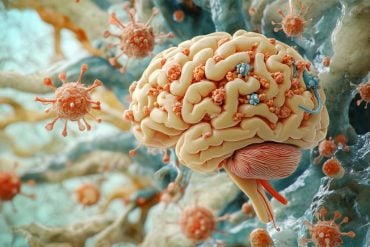Summary: Poor sleep and inadequate oxygen supply associated with obstructive sleep apnea appears to affect cytokines. This could explain the link between OSA and an increased risk of autoimmune disorders, such as rheumatoid arthritis.
Source: University of Georgia
New research by University of Georgia scientists sheds light on why people with obstructive sleep apnea may have associated autoimmune disorders. The results could lead to better approaches to treatment and possibly new drug therapies.
The study, led by Bradley Phillips, builds on previous research showing that obstructive sleep apnea increases the risk for autoimmune diseases. Immune system disorders are a result of either low activity or over activity of the immune system and include well known conditions such as lupus and rheumatoid arthritis.
“This paper looks at what may be the underlying mechanisms that increase someone’s risk for autoimmune disorders because they have untreated obstructive sleep apnea,” said Phillips, director of UGA’s Biomedical and Health Sciences Institute.
Obstructive sleep apnea, or OSA, is a disorder that occurs when throat muscles relax temporarily, narrowing or collapsing the airway and momentarily cutting off breathing during sleep. The main treatment for OSA is continuous positive airway pressure, or CPAP, which pumps air through a mask to keep the airway open. About 40% of patients can’t tolerate CPAP.
OSA damages the health of 35% of Americans and results in increased risk of several autoimmune disorders, like rheumatoid arthritis and psoriasis, for example, but the molecular links to autoimmunity are poorly understood.
Phillips and the team looked at four cytokines–proteins involved in cell signaling–associated with autoimmune disease. They evaluated the cytokines in three groups of adults: patients with untreated OSA, patients with OSA who were receiving treatment, and people who did not have OSA. The study results revealed abnormal levels of the four cytokines in patients with untreated sleep apnea, suggesting that poor sleep and inadequate oxygen supply may affect the cytokines.
This study, published in Clinical Immunology, is one of four investigating possible links between obstructive sleep apnea and specific diseases. In addition to autoimmune disorders, the team is also looking at neurodegenerative disorders, cardiovascular disease and renal disease.

“The relationship between OSA and other diseases is always complex to study. OSA in adults is commonly first diagnosed in midlife, but increases with age,” said Phillips, professor in the College of Pharmacy. “With increased age, you are also at risk for other diseases, and it’s very challenging for clinicians and researchers to determine if it’s OSA alone that causes other disorders, or if OSA only worsens the severity and progression of an underlying disease. In the case of high blood pressure, we know untreated OSA can cause hypertension and make blood pressure drug therapy ineffective. If obstructive sleep apnea is a key player, then it should be evaluated and treated along with other conditions.”
The team conducted its research at UGA’s Clinical and Translational Research Unit, where Phillips is director. CTRU is part of the Georgia Clinical & Translational Science Alliance, a multi-institutional partnership between UGA, Emory University, the Morehouse School of Medicine and the Georgia Institute of Technology that leverages their complementary strengths to accelerate clinical and translational research, education and community engagement to impact health in Georgia. Phillips serves as UGA’s principal investigator for Georgia CTSA.
Co-authors on the study include Ye Wang, a Ph.D. student in statistics; Suresh Ambati, assistant research scientist in genetics; Ping Ma, professor in statistics; and Richard Meagher, Distinguished Research Professor of genetics. All are part of the Franklin College of Arts and Sciences.
Funding: For this project, Meagher, Ambati and Phillips were supported by the National Center for Advancing Translational Sciences of the National Institutes of Health under award No. UL1TR002378 and UGA’s Clinical and Translational Research Unit. Wang and Ma were supported by National Science Foundation grants DMS 1925066, NSF grants DMS 1903226, and NIH grants R01 GM122080.
About this neurology research news
Source: University of Georgia
Contact: Bradley Phillips – University of Georgia
Image: The image is in the public domain
Original Research: Closed access.
“Airways therapy of obstructive sleep apnea dramatically improves aberrant levels of soluble cytokines involved in autoimmune disease” by Bradley Phillips et al. Clinical Immunology
Abstract
Airways therapy of obstructive sleep apnea dramatically improves aberrant levels of soluble cytokines involved in autoimmune disease
Obstructive Sleep Apnea (OSA) damages the health of 35% of adult Americans. Disordered sleep results in increased risk of several autoimmune disorders, but the molecular links to autoimmunity are poorly understood. Herein, we identified four cytokines associated with autoimmune disease, whose median serum levels were significantly different for OSA patients receiving airways therapy, from the levels in untreated OSA patients, APRIL (5.2-fold lower, p = 3.5 × 10−11), CD30 (1.6-fold higher, p = 7.7 × 10−5), IFN-Alpha-2 (2.9-fold higher, p = 9.6 × 10−14) and IL-2 (1.9-fold higher, p = 0.0003). Cytokine levels in airways treated patients were similar to the levels in control subjects. t-SNE and UMAP analysis of these high dimensional patient cytokine data identified only two groups, suggesting a similar global response for all four cytokines to airways therapy. Our findings suggest the levels of these four cytokines may be altered by disordered sleep and perhaps by chronic hypoxia. Therapeutic options are discussed.






